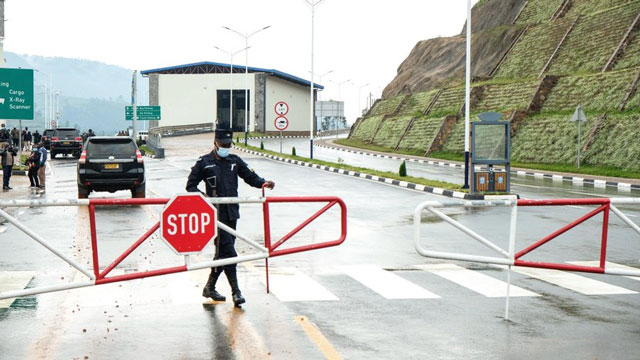
Kampala, Uganda | THE INDEPENDENT | Trade rights advocates in the region have decided not to withdraw their case against the governments of Uganda and Rwanda over the closure of the border almost three years ago, even after Rwanda announced it was re-opening it.
Rather, the groups, the Eastern African Sub-Regional Support Initiative for the Advancement of Women (EASSI), Southern and Eastern Africa Trade Information and Negotiations Institute (SEATINI), and the Center for Food and Adequate Living Rights (CEFROHT), say what is happening at the border has not changed the situation for cross-border traders.
In the 2019 public interest case, the three sought the East African Court of Justice to among others, declare that the act infringed the East African Treaty and violated the provisions of several articles of the protocol on the establishment of the East African Community Common Market.
These touch on the free movement of persons, goods, and capital, which have been affected by the closure of the border. The suit followed an outcry from the small-scale traders at the border who reasoned that they should have been given notice before the intending closure of the border, so that they prepare for the businesses to close or relocate.
Miria Akankwasa Tugume quit her occupation as a trader two years after closing her shop at Katuna due to the prolonged border closure, and she joined politics. Fortunately for her, she was elected a councilor to the Kabale District Council.
Tugume says for example that she had supplied customers in Rwanda, who were yet to pay her when the border closed, and that this also is the situation with other business operators.
There are currently no statistics regarding the losses incurred by the people who relied on cross-border trade but according to the Bank of Uganda trade statistics, Uganda’s average monthly exports to Rwanda plunged to 4 million dollars in 2019 from 18 million in 2018.
In 2020, Uganda’s exports to the country were worth just 2 million dollars, with traders trying to use Kyanika and Mirama Hills since Katuna was shut.
In the suit, the NGOs want the EACJ to declare that the act of closing the border posts and denying the accessibility of traders and citizens from either side violates the EAC protocols.
They also seek a permanent injunction against the two partner states on the closure of the border posts and violation of the economic rights of people who carry on cross-border trade between the two countries.
The suit also implores the court to issue an order that the two partner states make an economic and social audit to ascertain the extent of damage to the people and that the two governments adequately compensate the businesses affected by the closure of the border posts.
They also want an order that the border posts be completely opened with immediate effect “without any limitations whatsoever.”
The government of Rwanda said on Monday that they were not fully re-opening as a way of protecting her citizens against Covid-19.
Sheila Kawamara, the Executive Director EASSI says they cannot withdraw the case against the two countries because the governments have continued to negate their duties.
On why they sued Uganda jointly with Rwanda yet the border was unilaterally closed by Rwanda, Kawamara said Uganda did not seek redress for the three-year period, which makes it jointly liable.
Deborah Kyarisiima, another trader expressed disappointment that only trucks are being allowed into Rwanda, yet the pedestrians and cyclists are the ones who boost trade along the borders. She says the reopening of the border in its current form is useless to them, though it gives some hope of full reopening soon.
Kyarisiima calls on the two countries to talk honestly and find a lasting solution to the border grievances.
Assan Msimiraho, another trader on his part says the government of Uganda should find ways of rescuing the traders financially, as has been with businesses that were affected by Covid 19.
Some of these measures can be in terms of soft loans or direct financial handouts, as the government has been doing over the last two years to tame the effects of Covid 19.
But for Msimiraho, for as long as the Rwandans are not allowed to cross into Uganda, the business will remain down.
Apart from the closure of the border and the now partial closure, the business community has been finding challenges operating across borders because each country seems to have its own policies, despite the provisions for integration. These range from tax regimes, to road levies.
Rwanda and Tanzania have been accused of levying varying charges depending on the country a truck is from, yet the policies are supposed to be uniform, according to the traders.
Akankwasa says unless policies are harmonized, including the new ones like Covid 19 testing, trade in the region will always have challenges.
The NGOs want a permanent solution and measures to ensure that such occurrences should not happen again.
Apart from the socio-economic effects of border closures and other disputes between countries on the citizens, they send a bad image about the EAC to the international community.
This also affects the confidence of foreign investors in the region’s business environment since investors prefer operating under predictable policies.
SEATINI Uganda Chief Executive Jane Nalunga is more concerned that the East African Community, which has been hailed as a shining example of African integration, is embroiled in political disputes and non-tariff barriers, as well as competition amongst themselves.
She says unless the authorities do not work for the good of the people, the integration process is irrelevant.
****
URN
 The Independent Uganda: You get the Truth we Pay the Price
The Independent Uganda: You get the Truth we Pay the Price


